Azerbaijan Says It Will Use Armenian Airspace After Iran Bans 'Military Flights'
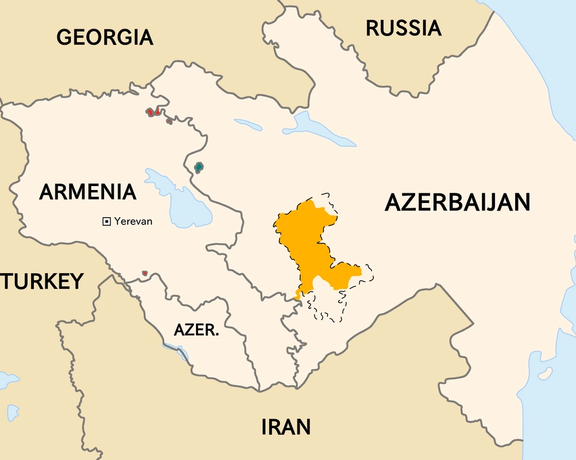
Azerbaijan has announced that it will use Armenia’s airspace for flights to its Nakhichevan enclave after Iran on Tuesday closed its airspace to these flights.

Azerbaijan has announced that it will use Armenia’s airspace for flights to its Nakhichevan enclave after Iran on Tuesday closed its airspace to these flights.
Armenia and Azerbaijan are technically at war with an agreed ceasefire in place along their border. The Armenian civil aviation committee has so far been silent about the news. Without Armenia’s permission, Azerbaijani overflights can become a new source of tensions.
The Azerbaijani national carrier AZAL said in a statement on Wednesday, “From now on, AZAL can use all available air corridors, including those passing through the territories of Armenia and Iran, in carrying out this flight.”
Tensions between Iran and the Republic of Azerbaijan have spiked in recent weeks, as Baku arrested two Iranian truck drivers travelling to Armenia in a segment of territory under its control. Iran announced Tuesday that it will not allow Azerbaijani flights carrying military provisions to use its airspace to reach Nakhchevan. The enclave is surrounded by Iran and Armenia.
It is not clear why the civilian airliner wants to divert all its flights.
Land transit from Azerbaijan Republic through Iran to Nachchevan has not been restricted.
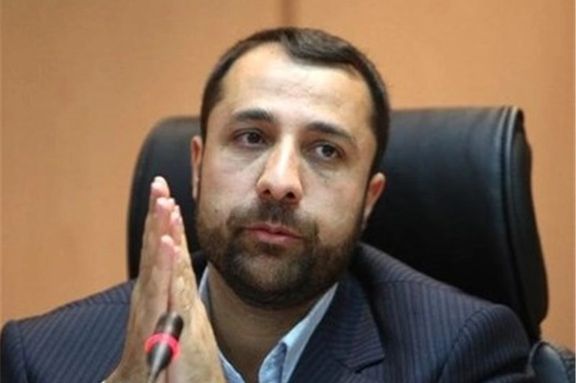
The government of President Ebrahim Raisi on Wednesday approved the appointment of a 43-year-old economic functionary as Chairman of Central Bank of Iran (CBI).
Ali Salehababdi is now another younger member of Raisi’s team. He was during the revolution in Iran, which overthrew the monarchy and established the Islamic Republic.
Although Iran’s central bank does not have the independence that many other central banks around the world enjoy, its chairman can still have an input in economic decisions such as the extent of the money supply and interest rates.
Salehabadi, who was appointed as the first chairman of Iran’s securities and exchange commission when he was 28, has a PhD from Tehran University in “financial management” according to local media. He also held other positions in the quasi-governmental financial system, such as chairman of the state-owned Export Development Bank of Iran (EBDI) since 2014.
The bank was sanctioned by the United States in 2008, for violating United Nations sanctions in “providing or attempting to provide financial services to Iran's Ministry of Defense and Armed Forces Logistics (MODAFL).”
Salehabadi is yet another member of president Raisi’s team, along with several others, who have been either sanctioned in person or associated with sanctioned entities. Raisi, himself, has been sanctioned by the Trump administration.
Local media in Tehran said there are expectations that Salehabadi would lower interest rates and boost the Tehran stock market, which has a checkered history of government manipulation. In 2020, the market index grew to 2 million units encouraged by the government and then fell by 50 percent, wiping out the savings of many small investors, who had flocked to the exchange to protect their capitals from depreciation of the local currency against the dollar.
Iran has been printing money to finance government operations since the United States imposed sanctions in 2018, banning crude oil exports. This led to a huge growth in liquidity and a 50-percent inflation rate.
The only economic salvation for Iran would be an agreement with the United States over its nuclear program and other issues and lifting of economic sanctions.
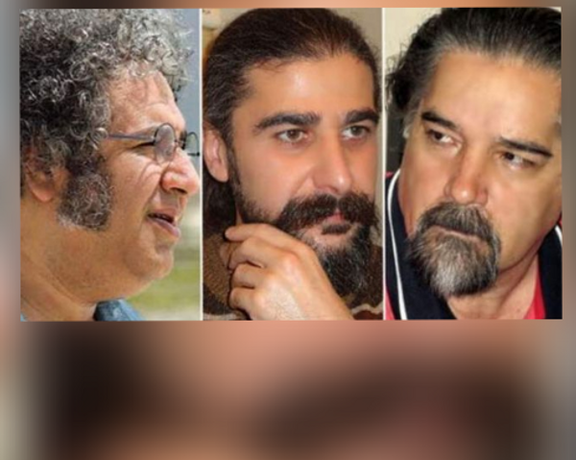
PEN America has bestowed its 2021 PEN/Barbey Freedom to Write Award to three imprisoned Iranian writers in a ceremony in New York on Tuesday.
The award that was announced in September was officially presented in a gala with the attendance of 800 guests representing New York’s cultural elite.
The three writers received more than a 15 years of prison sentences together in May 2019 for “crimes against national security”, a typical charge the Islamic Republic routinely makes against activists, writers and journalists to stifle criticism.
Reza Khandan Mahabadi, Baktash Abtin and Kayvan Bajan, were convicted of "propaganda against the state" and "acting against national security”, each receiving a more than five-year sentence. The three are members of the Iranian Writers Association, which has been banned and its members persecuted by threats and jail sentences.
At the time the Writers Association issued a statement saying, "This trial is not just the condemnation of three writers. This was not a trial against the Writers Association alone. It’s a condemnation of all writers and others who want to enjoy the right to free expression.”
PEN America, a non-profit defending freedom of expression and human rights, held its 2020 annual event virtually due to Covid-19, but this year resumed its traditional gala, where the award for the Iranian writers was the most prominent event.
"They are writers who are called not only to offer prose and ideas on a page, but to live fearlessly—and sacrifice immensely in service of the liberties that underpin free thought, art, culture, and creativity," PEN CEO Suzanne Nossel said in a press release before the event.
PEN America followed the case of the three writers from the very beginning of their arrest and trial. In May 2019, the organization expressed its concern.
"PEN International is alarmed about the large number of writers and activists in Iran who have been detained or imprisoned solely for exercising their right to freedom of expression," the group said.
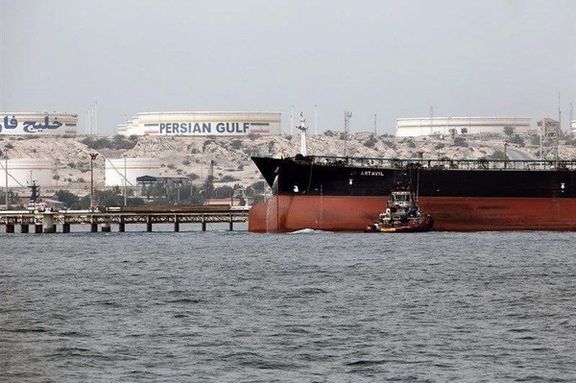
A third tanker carrying Iranian fuel for Hezbollah in Lebanon has reached the Syrian port city of Baniyas, TankerTrackers.com reported on Twitter on Wednesday.
“FORTUNE (9283746) is the 3rd tanker to have reached Baniyas, Syria with gasoil for Hezb’Allah’s distribution in Lebanon. Also, in addition to Iranian crude oil, Baniyas has received a larger-than-usual delivery of Russian fuel. What’s unique is that it wasn’t for navy in Tartus,” TankerTrackers.com said.
The Iran-aligned Hezbollah movement says the shipments it is importing should ease a crippling energy crisis in Lebanon. Part of the shipment will be sold by Hezbollah according to local media. Fuel will also be distributed among hospitals and other essential service centers.
It is not clear how much of the oil has been transported to Lebanon by land. Thousands of trip by tanker trucks are required.
Lebanese Prime Minister Najib Mikati said last month the Iranian fuel shipments constitute a breach of Lebanon's sovereignty.
Both Syria and Iran are under US sanctions.
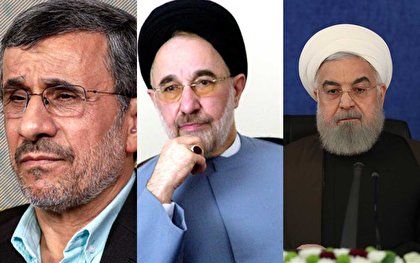
A prominent right-wing commentator in Iran has called the country's former presidents opposition figures and said that the regime should “twist their arms.”
Hassan Rahimpour Azghadi, an ultraconservative commentator who usually speaks on Iranian national television as a member of the Cultural Revolution Council, said in an interview with the right-wing Students News Network (SNN) that criticisms by former presidents of Iran are "non-constructive" and aimed at "toppling other political figures and replacing them."
Among former presidents only populist Mahmoud Ahmadinejad (2005-2013) has been vocal since 2017 when his candidacy for president was rejected by the Guardian Council, controlled by Supreme Leader Ali Khamenei. His successor Hassan Rouhani has disappeared from the scene after his term ended in early August, and Mohammad Khatami (1997-2005) has been forced into silence by the intelligence services. Even Khatami’s photos are banned from government-controlled media.
Hardliners loyal to Supreme Leader Ali Khamenei have been occasionally attacking former presidents for not being fully in synch with prevailing policies. They have been even running a campaign to prosecute Rouhani.
Aghzadi even named the deceased former deputy supreme leader Ayatollah Hossein Ali Montazeri and the Islamic Republic's first Prime Minister Mehdi Bazargan as opposition figures. What all these politicians had in common was open or indirect disagreement with the overarching power of the Supreme Leader in the Islamic Republic.
Azghadi further criticized the former presidents for questioning the validity of the Islamic Republic's Constitution once they left office. However, he failed to mention that Mohammad Khatami and Hassan Rouhani had spoken out even when they were in office.
Azghadi stressed that those former officials need to understand that what they criticize now is the outcome of their own political performance. Meanwhile he claimed that former officials should not act against the system as this is a political system that can be reformed through democratic means.
He made the statement mindless of the fact that the existence of the non-elected Guardian Council that handpicks election candidates based on their loyalty to the Supreme Leader is far from being democratic.
A commentary published by Iran's leading economic daily Donyaye Eqtesad tried to respond to hardliner rhetoric by observing that former presidents have always been complaining about the intervention of non-elected and institutions without executive responsibility in the affairs of their administration.
The daily pointed out that if former presidents sound like opposition figures, then tens of millions of voters who had voted for them in various rounds of elections are now part of the opposition.
Donyaye Eqtesad also pointed to the limitations imposed on Mohammad Khatami, saying that “his arm has already been twisted.” The daily also reminded that that two months after Hassan Rouhani left office, he was mentioned only once in the media with no derogatory comment when he sent a condolence message following the death of a top cleric.
The daily wrote that if anyone's arm is to be twisted, it is the arm of those, including Azghadi, who have been on the Cultural Revolution Council and have degraded Iranian universities to the level of high schools.
The commentary asked at the end whether Vice President for Economic Affairs Mohsen Rezaei, a former commander of the IRGC and a candidate in the presidential election, is also an opposition figure, because he said during televised debates that hardliners "have kicked so many revolutionary figures out of the train of the revolution that what has remained of the revolution is a scooter!"
The daily also asked referring to Azghadi’s opposition against all presidents since 1990: "If being an opposition figure is bad, why Azghadi himself has been an opposition figure for such a long time?"
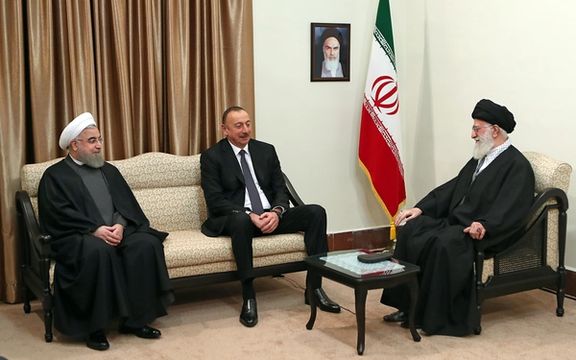
Tension between Iran and Azerbaijan heightened Tuesday as Baku shut down an Iranian mosque and Tehran barred Azerbaijani military flights over its territory.
Facing his first crisis in office, Hossein Amir-Abdollahian, Iran’s foreign minister who met his Armenian counterpart Ararat Mirzoyan in Tehran Monday, arrived in Moscow Tuesday. A joint news conference with Sergei Lavrov, Russia’s veteran foreign minister, is scheduled for Wednesday morning.
Kazem Jalali, Iran's ambassador to Moscow, said Wednesday that the meeting had gained importance with developments in the Caucasus and in Afghanistan. Azerbaijan, Turkey and Pakistan continued trilateral military drills dubbed “Indestructible Brotherhood 2021" in the NAR Tuesday near the Iran border.
Moscow brokered an uneasy agreement ending last year’s six-week war between Azerbaijan and Armenia, when the Azeris reclaimed the disputed enclave of Nagorno-Karabakh. The situation has since simmered, with occasional violence, and have centered of late on a stretch of road linking Iran and Armeniaoccupied by Azerbaijani troops.
Several Azerbaijani news agencies reported that Iran on Tuesday informed Azerbaijan that it had closed Iranian airspace to Azerbaijani aircraft carrying military supplies to the Azeri enclave ‘Nakhchivan Autonomous Republic,’ bordered by Armenia and by Iran to its south.
The move angered Baku, which called it an act dictated by Armenia. The defense ministry issued a statement calling the decision a betrayalthat led it to draw “unambiguous conclusions” about Iranian foreign policy.
The statement denied Iran’s move would “cause substantial harm to Azerbaijan.” Without access to Iranian airspace, Baku would need to supply the NAR by a roundabout route through Georgia and Turkey.
The Iranian Embassy in Baku in a statement Tuesday said Azerbaijani police inspected the Iranian mosque known as Iranian Husseiniya in Baku and shut it down.
Ehsan Zahidov,spokesman for the Azeri interior ministry, told the Qafqazinfo news-site that Covid infection had risen in recent days in several places in Baku, including the mosque. Zahidov said other places have been shut down for the same reason to allow preventative action.
The mosque is affiliated to the Iranian embassy and houses the office of Ali-Akbar Ojaghnejad, representative in Azerbaijan of Iranian leader Ali Khamenei. Ojaghnejad holds daily prayers at the mosque. The Iranian envoy, Seyed-Abbas Mousavi, later said that the closure had not affected Ojaghnejad’s work, which is conducted in the same building.
The Iranian embassy in Baku was attacked by Azerbaijani protesters last Thursday evening. Mousavi said Friday he had strongly protested over "disrespect and aggression” and that four perpetrators had been detained.